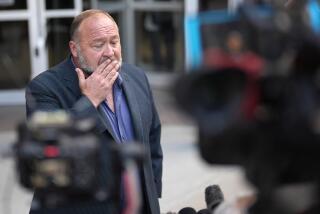S&L; Regulators Seeking Sanctions Against Neil Bush : Thrifts: The President’s son had conflicts of interest while director of a Colorado savings and loan, the Office of Thrift Supervision charges. The younger Bush denies any wrongdoing.
- Share via
WASHINGTON — President Bush’s 34-year-old son, Neil, is being charged in an administrative proceeding with conflicts of interest while a director of a failed Colorado savings and loan, the government said Friday.
The announcement came amid reports that the President is nearing a decision on appointing a new chairman of the Office of Thrift Supervision. The President’s appointee ultimately will decide whether to uphold the action against his son.
Neil Bush, a former director of Silverado Banking, Savings & Loan in Denver, has indicated that he will contest the OTS effort to impose a “cease-and-desist” order against him. He is accused of improperly voting in favor of a Silverado loan for a close business associate.
According to the Associated Press, Bush told a Denver news conference Friday that his father had given him “the same advice he has given me for 35 years: ‘Do what’s right.’ And I’m doing what’s right.”
The case will be argued before a government-appointed administrative law judge, who will recommend to the OTS chairman whether to uphold the cease-and-desist order. Neil Bush would have the right to appeal an adverse ruling by the OTS chairman in federal court.
OTS officials decided to issue a notice of the charges against Bush after he refused to accept a proposed settlement in the case. Bush, who resigned as a Silverado director two weeks after his father was nominated for President in August, 1988, said he refused to accept the settlement because it would be an admission of guilt.
“I have nothing to hide, and I have done nothing wrong,” Bush said in a statement. “Therefore, I have refused to consent to any agreement with the Office of Thrift Supervision, and if they choose to bring action against me, I will fight the matter in court.”
The collapse of Silverado, now part of First Nationwide Financial Corp., is expected to cost U.S. taxpayers about $1 billion.
Five other directors and officers of the failed thrift have signed OTS consent decrees that prohibit them from ever working for a federally insured financial institution without prior approval of the government.
Unlike the others, Bush was not involved in day-to-day management of Silverado.
Karl Hoyle, OTS senior deputy director, noted the action against Bush provides for a much less severe penalty than the consent decrees accepted by the other directors. He said the government did not have sufficient grounds to take stronger action against Bush.
A cease-and-desist order simply would make it easier for regulators to clamp down on Bush were he ever found to be acting improperly in the role of a thrift director.
Bush, a former partner in an oil exploration firm, JNB Exploration, had a business relationship with two of Silverado’s major borrowers, Bill L. Walters and Ken Good. He voted in favor of granting a loan to Walters, but abstained from voting on Good’s application.
In his statement, Bush said Walters had “a passive 6.25% limited partnership interest” in his exploration firm. He said he voted on Walters’ loan in 1986 “because I did not benefit directly or indirectly from any loan or transaction between Silverado and businesses controlled by Bill Walters.”
He said he did not vote on the other loan because Good had a more active interest in the financing and management of JNB. He also noted that both men were borrowers and preferred shareholders of Silverado before he became a director.
Warren Dennis, a Washington attorney and thrift industry expert, said the actions for which Bush is being cited are commonplace because thrifts often choose directors whose business connections will attract borrowers. “If this bank hadn’t gone belly up,” he said, “this charge wouldn’t have risen to an agenda item.”
Dennis said most businessmen in Bush’s predicament simply accept a cease-and-desist order, assuming that it will have no impact on their future business. But he said it is understandable that a prominent person such as the President’s son would not want to accept such a solution.
According to OTS officials, the administrative hearing process on such a charge usually takes between nine months and a year to complete.
OTS officials emphasized that the proceedings do not preclude the Justice Department from bringing criminal charges against the Silverado directors or the Federal Deposit Insurance Corp. from seeking to recover damages from the directors.
FDIC officials have said they are considering suing Silverado officers, including Bush. The suit would cite an unusual number of transactions between Silverado officials and borrowers.
Meanwhile, American Banker reported Friday that three men have been interviewed as possible candidates to replace OTS Chairman M. Danny Wall, who resigned Dec. 4 under fire for his agency’s failure to act more swiftly to close down high-flying thrifts such as Silverado and Lincoln Savings & Loan. The reported candidates are:
- Philip C. Jackson Jr., 61, an adjunct professor of money and banking at Birmingham Southern College in Alabama and a former Federal Reserve Board governor.
- Robert S. Boyd, a Washington consultant who served as minority staff director of the Senate Banking Committee in the 1970s and was a Citicorp executive until 1987.
- Frederick D. Wolf, former assistant controller general at the General Accounting Office, who last summer became a partner in Price Waterhouse’s Washington office. While at the GAO, he estimated that the cost of the thrift bailout would exceed Administration estimates.
More to Read
Inside the business of entertainment
The Wide Shot brings you news, analysis and insights on everything from streaming wars to production — and what it all means for the future.
You may occasionally receive promotional content from the Los Angeles Times.










